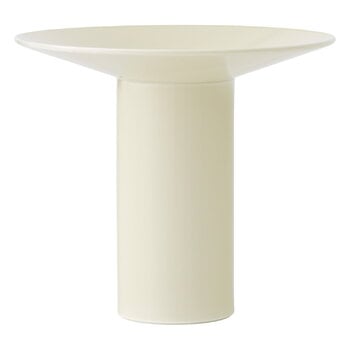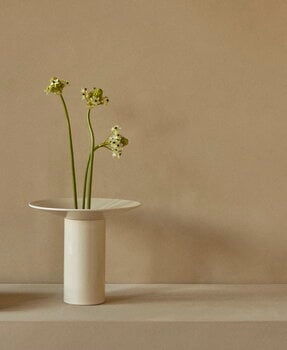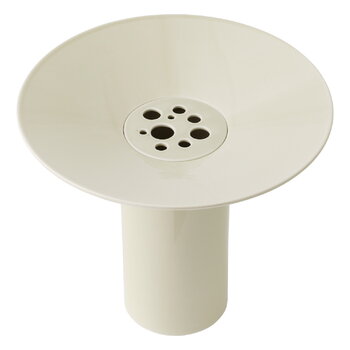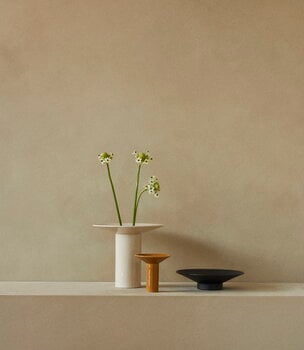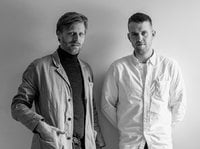Audo Copenhagen’s Hana vase draws inspiration from Japanese ikebana arrangements, resulting in an exquisite ceramic piece. Created by the design studio Krøyer-Sætter-Lassen, the Hana vase features a cylindrical base and a wide cone-shaped rim resting atop, providing an elegant framework for various types of floral compositions. Crafted from glazed stoneware, this vase comes equipped with a Japanese kenzan flower frog, featuring differently sized holes to facilitate the arrangement of flower stems and branches. When needed, the kenzan can also be detached, allowing Hana to serve as a more traditional vase for classic flower bouquets.
Hana vase, 26 cm, ashen
Audo Copenhagen
Description
Audo Copenhagen’s Hana vase draws inspiration from Japanese ikebana arrangements, resulting in an exquisite ceramic piece. Created by the design studio Krøyer-Sætter-Lassen, the Hana vase features a cylindrical base and a wide cone-shaped rim resting atop, providing an elegant framework for various types of floral compositions. Crafted from glazed stoneware, this vase comes equipped with a Japanese kenzan flower frog, featuring differently sized holes to facilitate the arrangement of flower stems and branches. When needed, the kenzan can also be detached, allowing Hana to serve as a more traditional vase for classic flower bouquets.
Product details (4)
- Material
- Glazed stoneware
- Colour
- Off-white
- Height
- 26 cm
- Diameter
- 29 cm
- Product ID
Designer
Kroyer-Saetter-Lassen – or Krøyer-Sætter-Lassen in its Danish form – is a Copenhagen-based design studio founded in 2016 by Mads Sætter-Lassen and Emil Krøyer, both graduates of the Royal Danish Academy of Fine Arts, School of Design. The duo’s approach to design is honest, based on their strong cultural understanding and Danish design heritage. In their products, Krøyer-Sætter-Lassen strives to combine art and functionality.
View all productsReviews (0)
Sustainability
The Product Sustainability Framework, our criteria of sustainable design, helps you find the most sustainable products in our selection. Read below which sustainability criteria this product has met.
Working conditions & labour 7/9
-
Equal opportunities for all employees
-
Commitment to UN Global Compact, fair compensation for all employees
-
Corporate responsibility requirements defined and communicated for suppliers
-
Systematic work for improved inclusion and well-being in the workplace
-
Transparent supply chain
-
Suppliers' compliance to a code of conduct ensured
-
Compliance to the UN Guiding Principles on Business and Human Rights ensured in the supply chain
Eco-friendly production 8/9
-
Fair and resource-wise water-use in production
-
No incineration or landfilling of returned items
-
No use of endangered species as materials
-
No direct environmental emissions or waste (excl. GHGs) from production
-
The sustainability of direct suppliers' production is addressed and monitored
-
Production and material sourcing that respect biodiversity, animal rights, and natural ecosystems
-
Material-efficient and ecological packaging
-
No potentially harmful chemicals used in own production
Climate impact 4/8
-
Company's direct greenhouse gas emissions identified and commitment to reduction
-
Product's carbon impact identified and commitment to reduction
-
Guidance on energy- and eco-efficient use of the product
-
Carbon footprint of the product calculated and goals set to reduce it
Sustainable materials 6/6
-
Sustainable and long-lasting material choices
-
No harmful or hazardous substances
-
Responsible raw material sourcing and production
-
Materials suited for circularity: monomaterials, recyclable finishings, renewable or recycled contents etc.
-
Ecological materials: natural, biodegradable, recyclable or recycled contents
-
Outstanding materials in terms of innovativeness, responsibility, sustainability and circularity: local production or sourcing, 100 % recycled content, C2C-certification etc.
Circular design 4/5
-
High aesthetic quality promoting long-term use of the product
-
Technically durable product design and material choices
-
Design for enduring life-long quality
-
Design and support for product maintenance, repair and upgradability

